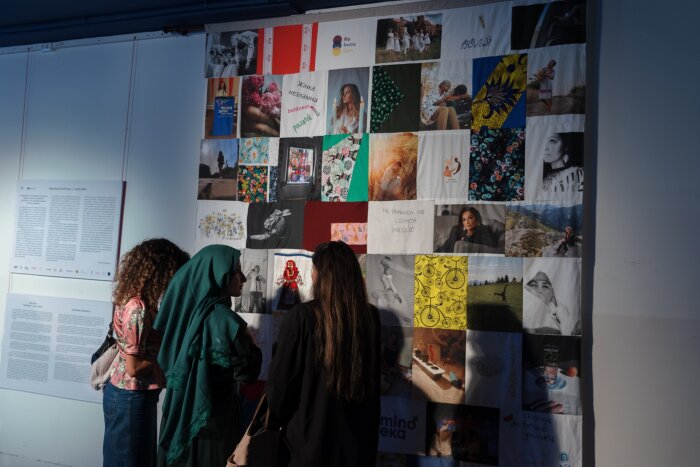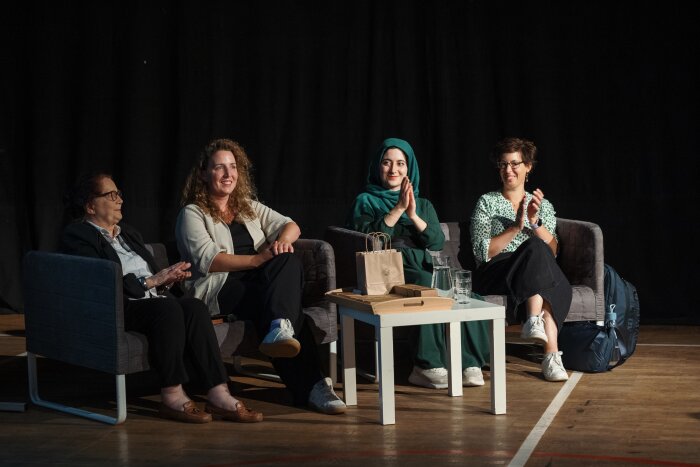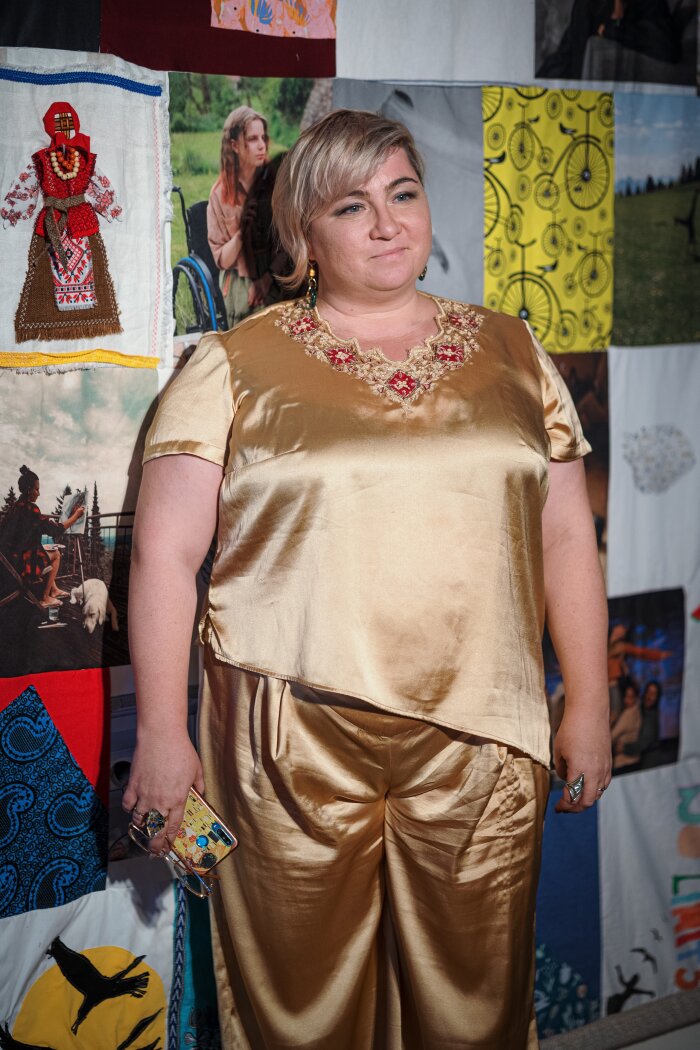-
 Warsaw photo exhibition
Warsaw photo exhibition -
 Discussing photo-voicing in Warsaw
Discussing photo-voicing in Warsaw -
 In front of her work
In front of her work
Aim and objectives
The ReIncluGen project aims to study and co-construct creative and innovative ways to help reverse socio-economic and cultural inequalities and help realise gender empowerment and inclusion of migrantised women and girls across societal, cultural and economic contexts in Europe. In order to realise this the project aims to rethink and move beyond gender empowerment as a container term. In doing so, ReIncluGen will consider a more critical and holistic approach of empowerment that aims to rethink and re-imagine gender empowerment as a process, with different manifestations depending on the socio-political context, rather than as a loosely articulated outcome. By researching the various concepts of gender empowerment that are present, as well as the discourses in digital media, we will automatically also touch on issues of structural violence. Focusing on the target group of migrantised women and girls and the diversity and agency within this group is of particular relevance which leads us to approach gender empowerment as interrelated to issues of gender, class and race. As a consortium, we strongly support the right to movement and migration of every person. Despite the potential for this right to migration to improve women’s lives, we are aware of the many disadvantages and risks that women face as compared to men. Moreover, our focus on migrantised women and girls will bring along different meanings and understandings of gender empowerment that will challenge liberal and Western notions of freedom and empowerment on which many policy initiatives and policies are built in a paternalistic way to ‘empower’ or ‘save’ migrantised females.
The first objective of the ReIncluGen project is to use a bottom-up and participatory approach to unpack the different meanings of gender ‘empowerment’ across societal spheres and contexts. A second objective is to evaluate the empowering and inclusive work and impact of CSOs in order to further support them in their (digital) needs. A third objective is to examine the discourses and actions of media and digital cultures in strengthening, supporting or contributing to gender empowerment. In doing so, we aim to understand the impact of these media discourses on the used CSO practices and vice versa.
Participatory Action Research
The ReIncluGen project strongly believes that a collaboration between academic research institutions and CSOs generates more innovative insights and creative solutions to foster gender empowerment and inclusion as CSOs are positioned closer in relation to marginalised or disadvantaged groups in European societies. Applying a participatory and co-creative action approach with European CSOs, their target groups and members not only goes back to the roots of gender empowerment - which are in the social action ideology of the 1960s and the self-help initiatives of the 1970s (Gibson, 1991) - it will also help us to examine and unravel the (situated) meanings of gender empowerment with explicit attention to migrantised women and girls and the diversity and agency within this group. Therefore, we will include a wide variety of CSOs working with and for migrantised women and/or girls focusing on themes such as gender equality, sexual or gender-based violence, representation, socio-cultural participation and labour market participation using education, media, networking, legal counselling and psychological therapy. To consider the socio-political context and CSO landscape within the project, we focus on six countries (Austria, Belgium, Italy, Poland, Spain and the Netherlands), that vary in terms of gender policies and inequalities, which may also impact the currently used CSO practises as well as processes leading to gender empowerment.
Media and discourse analysis
The arrival and popularity of new media, in combination with more traditional media usage, brings quite some opportunities and challenges for CSOs and other public and political actors regarding gender empowerment and feminism. As such it is often said that digital media have shaped feminist politics in recent decades. At a more individual level, the rise of social media practices stimulate the development of more specialised media channels and groups that empower young girls and women to speak up and find like-minded voices which could be of particular interest to find peers with similar dispositions (e.g., in terms of race, migration status, ethnicity, residency status, sexual orientation, age, etc). In the ReIncluGen project, we will examine this search for like-mindedness on social media, could work empowering and challenging at the same time.
Despite this huge potential to negotiate existing power hierarchies, to have agency and to find like-minded groups, there remain some inequalities in how people are regarded on these new media as well. Women are not always taken seriously as media and cultural producers. More specifically, the media practises and self-representations of (young and migrantised) women are often regarded with disdain and/or not taken seriously, or even seen as a threat to their well-being and safety. Even when looking at (online) movements that intend to tackle sexual discrimination (e.g., #metoo) not all voices have been heard equally, neglecting the importance of the intersectional lens (e.g., in terms of race). This is also often accompanied with the counter-narratives (e.g., #HimToo) and online aggressions. To fully understand the power and empowering potential of (digital) media and understand the impact of media discourses on gender empowerment and inclusion, this project will make a contextual analysis, in which policy, societal life spheres and cultural contexts are considered.
Impact
The scientific impact of the ReIncluGen project is both theoretical and methodological. Theoretically, it builds on the innovative framework of ‘situated’ intersectionality by introducing new understandings of gender empowerment considering the diversity and agency of migrantised women all over different contexts in Europe. Methodologically, it uses participatory action research, visual/artistic participatory research methods and discourse analysis on timely and rapidly changing topics which could inspire future academic research and projects. To establish a societal impact, ReIncluGen includes CSOs and their members throughout the project. Using PAR could work empowering as participants are more empowered to raise their voice and be included at all levels of decision-making. Hence, the development of a digital platform could stimulate sustainable impacts such as CSOs challenging the media landscape and improving media practices towards more inclusive representation. Additionally, ReIncluGen will have a technical and socio-economic impact as it is accessible, empowering for all participants, facilitates knowledge sharing and networking, and increases professionalisation for CSOs. Furthermore, the digital platform helps to evaluate and measure the societal impact of the actions of CSOs, facilitating labour market integration, economic empowerment and mental well-being for all. Finally, it could help to reflect on how an ‘ideal’ world could look like, making the implicit assumptions on practices as well as ‘invisible practices’ related to gender empowerment more explicit in the portal of the digital tool.